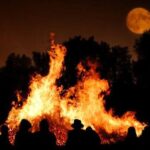by Amanda Gluckich – Milk and Honey Farm – Boulder, CO
In this week’s Torah portion, Parshat Ha’Azinu, we learn that the people of Israel, who have been wandering the desert for forty years after leaving Egypt, are about to enter the Holy Land that has been promised to them by God. Moses, who is not allowed to continue into the Holy Land due to previous transgressions, is preparing to sing a song to the people of Israel. The Torah portion, or parsha, is virtually entirely made up of song verses. Moses’s song speaks of the intergenerational tragedies and triumphs of the people of Israel, and even articulates the future to some degree. Moses sings of the people of Israel’s many struggles to accept one God, and of all of the things that God has done for them throughout the generations. Moses’s song brings everyone together and up to speed to explain why they are currently in the place they are in: about to be metaphorically born into the Land of Israel, promised to them by God. Moses begins:
“Listen, O heavens, and I will speak! And let the earth hear the words of my mouth!” (Deut. 32:1).
When reading the first line of Moses’s song, I wondered why he chose to call upon the heavens and the earth to witness this transitional moment of the Jewish people. This connection to the land and sky reminded me of the second day of creation when God separated the heavens and the earth:
“And God said, ‘Let there be an expanse in the midst of the water, and let it be a separation between water and water. And God made the expanse and it separated between the water that was below the expanse and the water that was above the expanse, and it was so. And God called the expanse Heaven, and it was evening, and it was morning, a second day’.” (Genesis 1:6-8)
I find it interesting that Moses appears to begin his song of the history of the Jewish people as far back as the story of creation; why did he need to go so far back, to a place in time that none remembered for themselves? It seems appropriate that Moses would start with the story of creation for a few reasons. The people of Israel at this time are being metaphorically reborn as they transition into the land promised by God to them. I also think that retelling the story of creation is a reminder that we are all connected – and that God not only created the world and everything in it, but also facilitated our connection to it in the most natural of ways.
“…you will eat your food until you return to the ground, since from it you were taken; for dust you are and to dust you will return.” (Genesis 3:19)
In the creation stories in the Torah, the heavens and the earth are clearly separated from each other. Similarly, the people of Israel are separating themselves from their dark past, Egypt, and focusing on their promising, bright future: Israel. It is not uncommon to see examples of separations in the Torah. For example, another correlation between the separation of the People of Israel from their past and their future is the first day of creation.
“And God saw the light that it was good, and God separated between the light and between the darkness.” (Genesis 1:4)
Judaism is compelled by separations (which is no surprise, considering our understanding of the birth of the universe was created through a separation) and much of what we learn as Jews forces us to question the many separations we encounter in our lives. Shabbat, the day of rest, is distinctly separate from the other days of the week when we work. Yom Kippur, a time of darkness and repentance gives way to Rosh Hashana, a time for renewal, a bright light to look forward to after a time of darkness. This brings us back to the Jewish People, the People of Israel, leaving behind a dark history for a bright future.
There are many iterations of separations within the Torah which are reflected as multi-faceted, deeply intertwined and equally revealing. With Rosh Hashana just days away, I pray that in a world brimming with separations, we are not only able to connect with Our Creator/The Universe in earthly ways, but also that we are able to see that without darkness, there cannot be light.
Amanda entered the JOFEE world as an Adamah Fellow in the Spring of 2013. She is excited to continue her journey as a Jewish outdoor, food, and farm educator by working as the Youth Farm Educator at Milk & Honey Farm, at the Boulder JCC. She has worked for 15 years as a cook and in the last few years has honed her skills in farming and homesteading. Amanda seeks to teach the world about her passion – food, and how we can use it to connect to our Jewish ancestors and their roles as agriculturalists. She is thrilled to join the Boulder Jewish community after living as a Moishe House resident for the last two years in Denver, CO. In her free time you can find her organizing community, cooking, tending to her herbal medicinal garden, and trying to convince someone to start making their own pickles instead of buying them from the store.
Editor’s Note: Welcome to D’varim HaMakom: The JOFEE Fellows Blog! Most weeks throughout the year, you’ll be hearing from the JOFEE Fellows: reflections on their experiences, successful programs they’ve planned and implemented, gleanings from the field, and connections to the weekly Torah portion and what they’ve learned from their experiences with place in their host communities for the year. Views expressed are the author’s and do not necessarily represent Hazon. Be sure to check back weekly!
